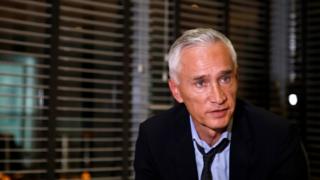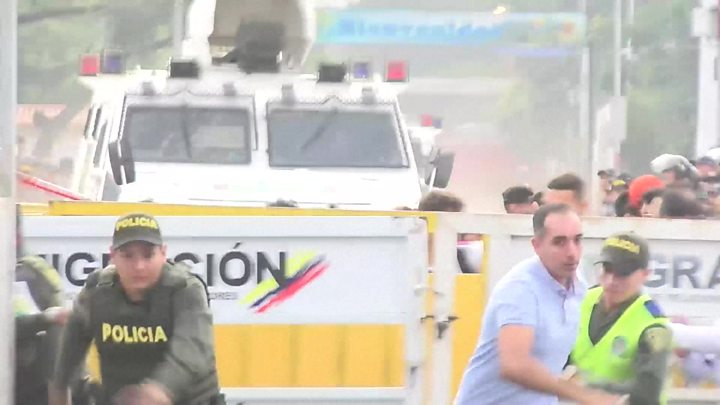 Image copyright
Image copyright
Reuters
Mexican-American journalist Jorge Ramos talks to the media after his crew’s release
US broadcaster Univision says its team was briefly detained in the Venezuelan presidential palace where they had been interviewing President Nicolás Maduro.
The incident happened after award-winning journalist Jorge Ramos showed Mr Maduro images of Venezuelans eating from a bin lorry, the network says.
Their equipment was confiscated.
Venezuela’s Information Minister Jorge Rodríguez said the government had welcomed hundreds of journalists but it did not support “cheap shows”.
Univision, the leading Spanish-language TV network in the US, said the six-member crew had been released after almost three hours but that their recording and personal belongings had not been returned.
Speaking on Univision, Mr Ramos said Mr Maduro “had not liked” some of the questions about “the lack of democracy in Venezuela, torture, political prisoners and the humanitarian crisis”.
“He got up after I showed him videos of young people eating out of a bin lorry,” he said of the interview at the Miraflores palace in the capital, Caracas.
“What I told Nicolás Maduro is that millions of Venezuelans and many governments around the world don’t consider him a legitimate president but a dictator.”
During their detention, Mr Ramos and Univision Vice President María Martínez were kept for “a few minutes” in a separate room where the lights were turned off, the broadcaster said.
The Univision crew will be deported on Tuesday, Reuters news agency reports.
Mr Ramos, a veteran Mexican-born American journalist, is known for his confrontational style of questioning. In 2015, he was thrown out of a news conference of then-presidential candidate Donald Trump.

Natalie Southwick, Central and South America programme co-ordinator of the Committee to Protect Journalists, said: “By shutting down an interview and censoring one of Latin America’s most high-profile reporters, Nicolás Maduro has demonstrated his fundamental disregard for the press.”
Last month, several local and foreign journalists were briefly detained while working in Caracas. Some ended up being deported.
On Twitter, Mr Rodríguez added: “Hundreds of journalists have come through Miraflores who have received decent treatment that we always give to those who do journalistic work.”
Earlier, a group of Latin American countries and Canada said Mr Maduro was a threat to peace and security in the region and called for his immediate exit, a democratic transition and free elections.
Meeting in the Colombian capital, Bogotá, the Lima group urged the International Criminal Court to consider whether Venezuela was guilty of crimes against humanity for refusing to allow aid into the country.
At least two people died in Saturday’s clashes between civilians and troops loyal to Mr Maduro that blocked the entrance of foreign aid organised by opposition leader and self-declared interim President Juan Guaidó.
Mr Maduro says the aid efforts are part of a US-orchestrated coup.
In other developments:
- More than 100 soldiers are said to have defected since the weekend. Speaking to the BBC, some of them say they fear for the safety of their families
- The US has announced new sanctions against four Venezuelan state governors allied with Mr Maduro
- The UN Security Council is due to meet later on Tuesday to discuss the crisis



